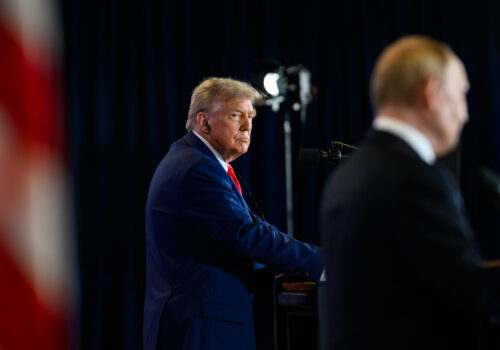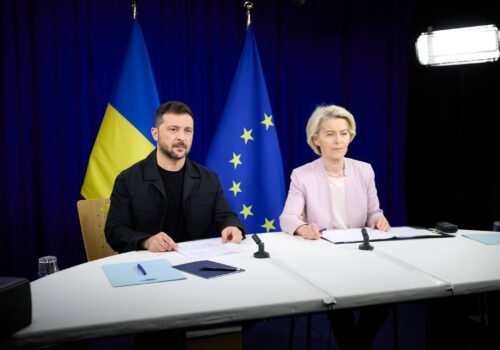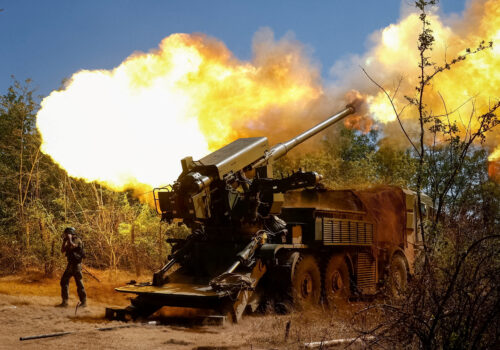In Beijing and Paris, a tale of two global futures
This week offered two starkly different versions of the global future.
In Beijing, the twenty-fifth meeting of the Shanghai Cooperation Organization, followed by the spectacle of a massive military parade, was a startling display of authoritarian solidarity. It included the first joint public appearance of Chinese President Xi Jinping, Russian President Vladimir Putin, and North Korean leader Kim Jong Un. It was nothing less than a bid to legitimize a new international order centered around Beijing and Moscow.
In Paris, some thirty democratic leaders of a self-selected “coalition of the willing” convened to reinforce their support for Ukraine—assembling the pieces for a security guarantee that would safeguard Kyiv’s sovereignty and independence. The leaders represented not only European nations, but Japan, Australia, and Canada as well. Think of them as a counterweight to the “Axis of Upheaval,” defending the post-1945 rules-based international system.
What both meetings had in common was that the United States was physically absent but very much present in what motivated each gathering. The meeting in Beijing was organized with the intention of replacing the global system that the United States has grown less interested in leading, while the one in Paris aimed to perpetuate that system, with less Washington and more Europe.
It was no surprise that US President Donald Trump wasn’t in Beijing. In a Truth Social post, he asked the Chinese leader to “give my warmest regards to Vladimir Putin, and Kim Jong Un, as you conspire against The United States of America.” That was a refreshing recognition on the part of Trump, who noted in the Oval Office on Wednesday, “They were hoping I was watching—and I was watching.”
“Yet what’s Mr. Trump’s strategy?” the Wall Street Journal editorial board asked today. “He hopes his personal diplomacy can help strike deals with different dictators on different issues. But America’s adversaries are united, while Mr. Trump hits U.S. allies with a tariff barrage.”
In Paris, those European leaders demonstrated that they are ready to take the initiative without waiting for Washington, while at the same time recognizing that any credible security guarantee requires US participation. The recent meeting of seven European leaders in the White House with Trump and Ukrainian President Volodymyr Zelenskyy underscored two things: the welcome fact of increasing European strategic coordination, which I wrote about here recently, and European leaders’ recognition that there is strength in numbers as they try to corral a wavering White House.
This week’s twin meetings were all about responding to Trump. Beijing was testing the readiness of non-Western powers to coalesce and fill whatever global leadership vacuum the US president wishes to leave. By contrast, Paris was an anxious signal that others must carry greater burdens if Washington is unwilling to do so.
The juxtaposition of the two meetings lays bare our global inflection point: Competing orders are crystallizing more sharply, while the United States—once the indispensable convener—considers its options. The question is not only which vision will prevail, but also what role the United States will play in determining that outcome—and the global future.
Frederick Kempe is president and chief executive officer of the Atlantic Council. You can follow him on X: @FredKempe.
This edition is part of Frederick Kempe’s Inflection Points newsletter, a column of dispatches from a world in transition. To receive this newsletter throughout the week, sign up here.
Further reading
Tue, Sep 2, 2025
It’s time for Trump to put maximum pressure on Putin
Inflection Points By Frederick Kempe
The US president can have no further doubt about who he’s dealing with in the Russian president. There’s also little doubt about what is needed to end the war on terms that secure peace and preserve Ukrainian freedom.
Sun, Aug 17, 2025
Will Europe rise to its strategic moment?
Inflection Points By Frederick Kempe
With the future of European security on the line, the Ukrainian president and several European allies will meet with US President Donald Trump on Monday.
Fri, Aug 29, 2025
Twenty questions (and expert answers) about the negotiations to end Russia’s war in Ukraine
New Atlanticist By
August saw a flurry of diplomatic activity to end Russia's full-scale invasion of Ukraine. As September nears, Atlantic Council experts share their insights on what to expect next.
Image: A composite of China President Xi Jinping addressing a military parade marking the 80th anniversary of victory over Japan and the end of World War II, in Beijing on September 3, 2025. (China Foreign Ministry handout) and French President Emmanuel Macron speaking during a joint press conference with Ukraine's President Volodymyr Zelensky following the Coalition of the Willing Summit, at the Elysee presidential Palace, in Paris, France on September 4, 2025. LUDOVIC MARIN/Pool via REUTERS



